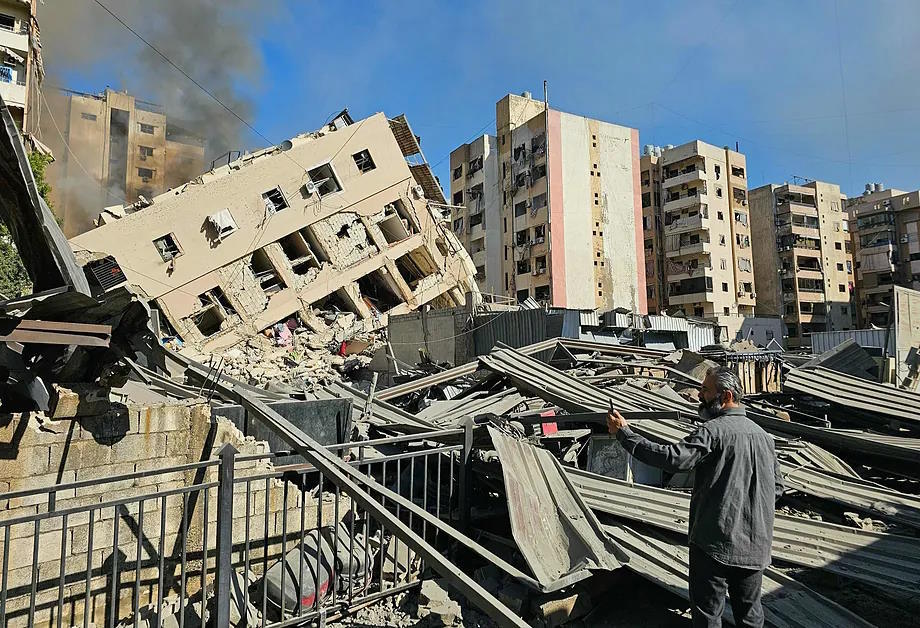The Israeli army has intensified its offensive in Lebanon while Tel Aviv, Washington, and Beirut discuss a possible ceasefire to end hostilities, as confirmed by various Israeli and Lebanese media outlets.
Israeli army chief, Herzi Halevi, approved the expansion of the ground invasion along the border last weekend after the initial assault failed to make significant progress.
The new Israeli attempt led to fighting on Friday in the village of Chama, five kilometers from the border line between the two countries. However, late Friday night, Hezbollah and its affiliated media claimed to have forced their adversaries to retreat.
The violent clashes caused severe damage to the medieval ruins and the well-known sanctuary of that town, which were already devastated during the 2006 war. One of the main Israeli newspapers, Yediot Aharonot, cited sources from their country admitting that the main objective of this new operation is to "pressure Hezbollah in parallel with negotiations."
Despite the initial severe blows Hezbollah received when the Israeli offensive began last September - including the assassination of its leader, Hasan Nasrala, and much of its leadership - the paramilitary group has managed to halt the Israeli ground invasion and maintain constant harassment of the neighboring country with its missiles, preventing the return of over 60,000 residents of the northern Israeli towns who had to be evacuated at the conflict's onset.
Tel Aviv acknowledges that its army - not designed for long campaigns - is beginning to feel the strain of the dual war it is waging on the Lebanese and Gaza fronts, and that the response of reservists, who are usually central to these military operations, is far from what was seen after the October 7 massacre.
The army's own data reveals that at least 40,000 Israeli reservists have not responded to the call to join the ranks. "The IDF (Israel Defense Forces) faces a serious shortage of soldiers," warned the Institute for the Study of War, an entity that typically reflects views close to Tel Aviv.
As columnist Yossi Verter wrote in Haaretz on Friday, the claims of the new Defense Minister, Israel Katz, who declared this week that his country "has defeated Hezbollah," were called into question in less than 48 hours by the new wave of rockets from the paramilitary group that fell on Israeli territory the following day - resulting in the deaths of two people in Nahariya - and the deaths of six soldiers in border clashes with the Arab nation.
The Israeli Research Center Alma, specialized in monitoring Hezbollah, estimated that as of November 11, the Lebanese front has caused the death of 108 people, including 67 soldiers. Hezbollah claims that since the start of the ground invasion in early October, they have killed over 100 soldiers from the neighboring country.
Meanwhile, Tel Aviv claims to have eliminated over 2,000 fighters from the irregular group.
Israeli experts acknowledge that Hezbollah's drones, in particular, have become a threat for which they have few answers. The Lebanese armed group stated days ago that they have launched over a thousand drones since the confrontation began.
Faced with the challenges their troops are encountering, Tel Aviv has decided to intensify its aerial bombardments, which are not only increasing in the capital but have spread across all Lebanese territory. The repeated airstrikes are targeting the Dahie neighborhood, which used to be the residence of the Shiite community and where the main offices of the group now led by Naim Qassem were located.
Even the spokesperson for the US State Department, Vedant Patel, expressed "concern" on Thursday about this escalation against the Lebanese capital, despite the almost unconditional support Washington is providing to the Israeli war machinery.
"You have heard us say time and time again that we do not want to see this type of military operations in Beirut, especially in densely populated areas," he stated.
Shortly after, Israel responded with new attacks in the same area, including the spectacular demolition of an 11-story building that collapsed after being hit by a missile.
The devastating toll of the Israeli onslaught in Lebanon exceeds 3,300 deaths, with over 1.4 million displaced and economic losses surpassing $8.5 billion, according to estimates by the World Bank last Thursday. The same institution calculated that nearly 100,000 homes have been destroyed or damaged by the Israelis.
The Israeli offensive has extended to the neighboring country, Syria, which has suffered several bombings in Damascus and Quseir, the latter on the border with Lebanon, in recent days. According to Reuters, the events on Thursday claimed the lives of at least 15 people.
The military skirmish is unfolding alongside diplomatic negotiations. Lebanese and Israeli media outlets reported that Israel and the US have presented a joint proposal being analyzed by local mediators, including the parliament president Nabi Berri.
The latter confirmed this in statements to local newspapers such as Al Jummuriya or Ad Diyar, admitting that there is a "50% chance" of reaching an agreement but at the same time rejecting some of the terms of the Israeli proposition.
According to Berri, US special envoy Amos Hochstein has received "green light" from the incoming US president, Donald Trump, to try to end the confrontation on the Lebanese front.
The plan includes the deployment of the Lebanese army along the border and the withdrawal of Hezbollah forces to the north of the Litani River, about 30 kilometers from Israeli territory.
According to reports from both countries, the main dispute revolves around Israel's demand to intervene militarily if they believe the treaty conditions are not being met or if they suspect Hezbollah is rearming, something Berri himself deemed "unacceptable."
